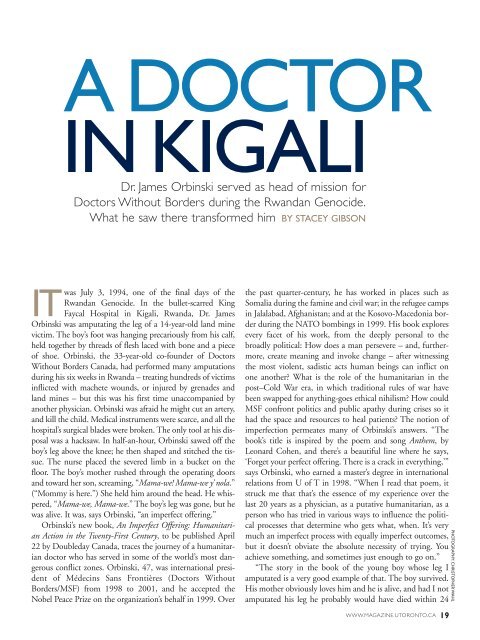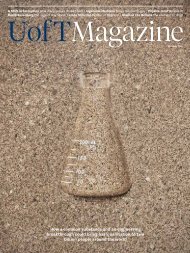20 MB - University of Toronto Magazine
20 MB - University of Toronto Magazine
20 MB - University of Toronto Magazine
- No tags were found...
Create successful ePaper yourself
Turn your PDF publications into a flip-book with our unique Google optimized e-Paper software.
ADOCTORIN KIGALIDr. James Orbinski served as head <strong>of</strong> mission forDoctors Without Borders during the Rwandan Genocide.What he saw there transformed him BY STACEY GIBSONJuly 3, 1994, one <strong>of</strong> the final days <strong>of</strong> theRwandan Genocide. In the bullet-scarred KingITwasFaycal Hospital in Kigali, Rwanda, Dr. JamesOrbinski was amputating the leg <strong>of</strong> a 14-year-old land minevictim. The boy’s foot was hanging precariously from his calf,held together by threads <strong>of</strong> flesh laced with bone and a piece<strong>of</strong> shoe. Orbinski, the 33-year-old co-founder <strong>of</strong> DoctorsWithout Borders Canada, had performed many amputationsduring his six weeks in Rwanda – treating hundreds <strong>of</strong> victimsinflicted with machete wounds, or injured by grenades andland mines – but this was his first time unaccompanied byanother physician. Orbinski was afraid he might cut an artery,and kill the child. Medical instruments were scarce, and all thehospital’s surgical blades were broken. The only tool at his disposalwas a hacksaw. In half-an-hour, Orbinski sawed <strong>of</strong>f theboy’s leg above the knee; he then shaped and stitched the tissue.The nurse placed the severed limb in a bucket on thefloor. The boy’s mother rushed through the operating doorsand toward her son, screaming, “Mama-we! Mama-we y’ nola.”(“Mommy is here.”) She held him around the head. He whispered,“Mama-we, Mama-we.” The boy’s leg was gone, but hewas alive. It was, says Orbinski, “an imperfect <strong>of</strong>fering.”Orbinski’s new book, An Imperfect Offering: HumanitarianAction in the Twenty-First Century, to be published April22 by Doubleday Canada, traces the journey <strong>of</strong> a humanitariandoctor who has served in some <strong>of</strong> the world’s most dangerousconflict zones. Orbinski, 47, was international president<strong>of</strong> Médecins Sans Frontières (Doctors WithoutBorders/MSF) from 1998 to <strong>20</strong>01, and he accepted theNobel Peace Prize on the organization’s behalf in 1999. Overthe past quarter-century, he has worked in places such asSomalia during the famine and civil war; in the refugee campsin Jalalabad, Afghanistan; and at the Kosovo-Macedonia borderduring the NATO bombings in 1999. His book exploresevery facet <strong>of</strong> his work, from the deeply personal to thebroadly political: How does a man persevere – and, furthermore,create meaning and invoke change – after witnessingthe most violent, sadistic acts human beings can inflict onone another? What is the role <strong>of</strong> the humanitarian in thepost–Cold War era, in which traditional rules <strong>of</strong> war havebeen swapped for anything-goes ethical nihilism? How couldMSF confront politics and public apathy during crises so ithad the space and resources to heal patients? The notion <strong>of</strong>imperfection permeates many <strong>of</strong> Orbinski’s answers. “Thebook’s title is inspired by the poem and song Anthem, byLeonard Cohen, and there’s a beautiful line where he says,‘Forget your perfect <strong>of</strong>fering. There is a crack in everything,’”says Orbinski, who earned a master’s degree in internationalrelations from U <strong>of</strong> T in 1998. “When I read that poem, itstruck me that that’s the essence <strong>of</strong> my experience over thelast <strong>20</strong> years as a physician, as a putative humanitarian, as aperson who has tried in various ways to influence the politicalprocesses that determine who gets what, when. It’s verymuch an imperfect process with equally imperfect outcomes,but it doesn’t obviate the absolute necessity <strong>of</strong> trying. Youachieve something, and sometimes just enough to go on.”“The story in the book <strong>of</strong> the young boy whose leg Iamputated is a very good example <strong>of</strong> that. The boy survived.His mother obviously loves him and he is alive, and had I notamputated his leg he probably would have died within 24PHOTOGRAPHY: CHRISTOPHER WAHLWWW.MAGAZINE.UTORONTO.CA 19
















